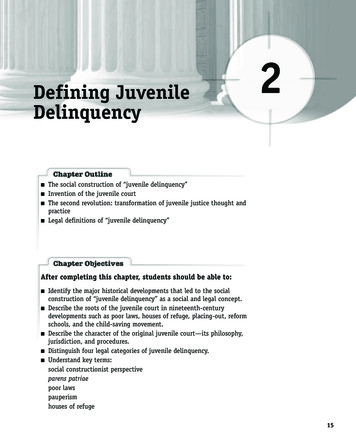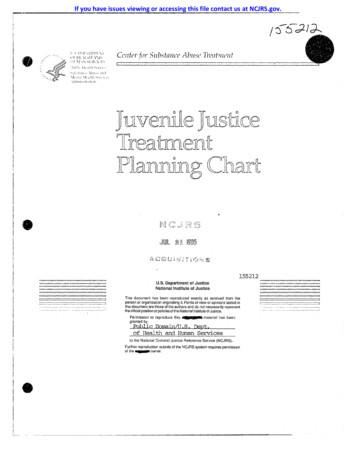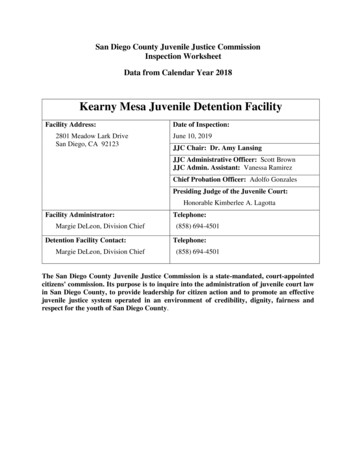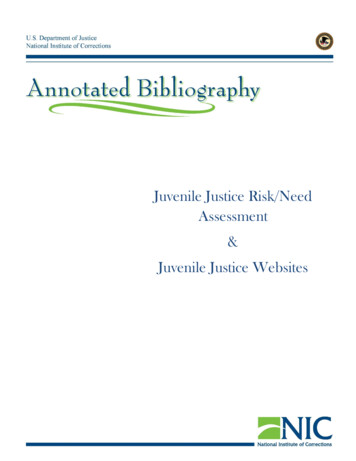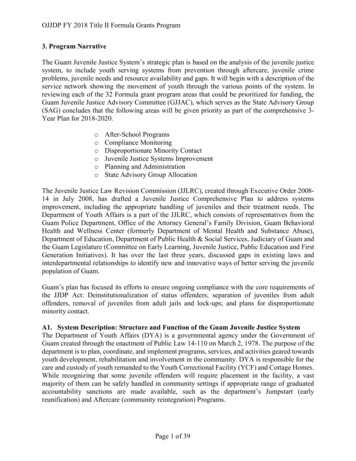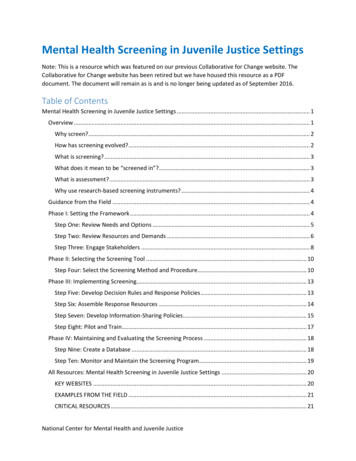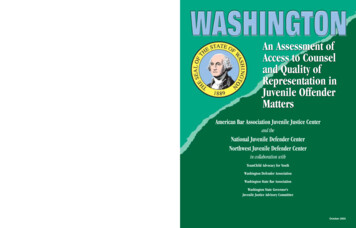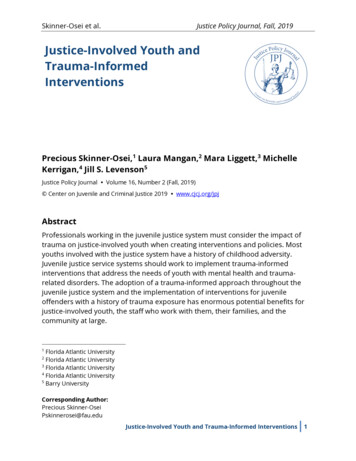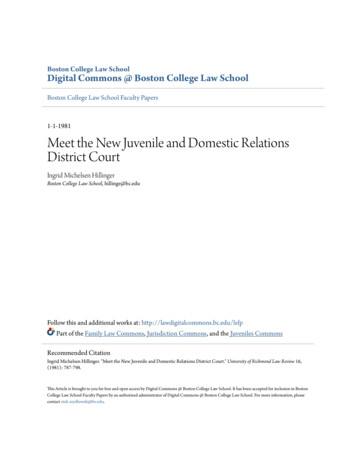
Transcription
Boston College Law SchoolDigital Commons @ Boston College Law SchoolBoston College Law School Faculty Papers1-1-1981Meet the New Juvenile and Domestic RelationsDistrict CourtIngrid Michelsen HillingerBoston College Law School, hillinge@bc.eduFollow this and additional works at: http://lawdigitalcommons.bc.edu/lsfpPart of the Family Law Commons, Jurisdiction Commons, and the Juveniles CommonsRecommended CitationIngrid Michelsen Hillinger. "Meet the New Juvenile and Domestic Relations District Court." University of Richmond Law Review 16,(1981): 787-798.This Article is brought to you for free and open access by Digital Commons @ Boston College Law School. It has been accepted for inclusion in BostonCollege Law School Faculty Papers by an authorized administrator of Digital Commons @ Boston College Law School. For more information, pleasecontact nick.szydlowski@bc.edu.
MEET THE NEW JUVENILE AND DOMESTIC RELATIONSDISTRICT COURTIngrid Michelsen Hillinger*I.INTRODUCTIONWithout trumpet or even modest fanfare, the 1981 Virginia General Assembly passed two new subsections to Title 16.1 of the Codeof Virginia, amending the jurisdiction of the juvenile and domesticrelations district courts (hereinafter cited as J & DR). Despitetheir uncontroversial passage, they portend significant changes forthe J & DR court and the circuit court as well, and have generatedsurprise and bewilderment among the J & DR court judges. l Thisarticle explores the meaning of the amendments and their longterm implications.II.THE AMENDMENTSThe amendments provide that the J & DR district courts shallhave exclusive jurisdiction over all proceedings involving "[a]nyperson who seeks spousal support after having separated from hisor her spouse."2 The parallel dispositional provision states that"[i]n cases involving a spouse who seeks spousal support after having separated from his or her spouse, the court may enter any appropriate order to protect the welfare of the spouse seeking support."s This fundamentally alters the jurisdiction and work of theJ & DR court, authorizing its intrusion into the hitherto sacrosanctdomain of the circuit court. In fact, these amendments may represent the first, albeit unwitting, step toward a true family lawcourt in Virginia.A. Do the Amendments Establish a New Right?Virginia traditionally has denied support to a spouse guilty of Assistant Professor of Law, College of William and Mary; B.A., Barnard College, 1968;J.D., College of William and Mary, 1976.1. The fall 1981 district court judges' conference devoted a full morning session to theseamendments. The Honorable Richard Jamborsky of the 19th Judicial Circuit and this author led the discussion.2. VA. CODE ANN. § 16.1·241(L) (Cum. Supp. 1981).3. VA. CODE ANN. § 16.1·279(M) (Cum. Supp. 1981).787
788UNIVERSITY OF RICHMOND LAW REVIEW[Vol. 16:787marital fault. 4 Read literally, the new amendments empower the J& DR court to enter any appropriate spousal support award to anyseparated spouse whose welfare requires protection. The new provisions do not mention marital fault, a pivotal issue in circuit courtproceedings considering support. IS Because they do not mentionmarital fault, they could be interpreted as establishing a new substantive right, namely, a spouse's right, regardless of marital fault,to seek support after separation if his or her welfare requires it.Although this interpretation is possible, it is improbable. For onething, noise and flurry generally accompany the creation of a newsubstantive right. These amendments crept in quietly, hardly alikely entry for a new right, especially one so radically differentfrom that which existed before. Presumably, if the amendmentswere intended as a revolutionary departure from prior law, theywould have sparked some controversy. Yet there was no apparentcontroversy surrounding their enactment. Furthermore, if theamendments do authorize a right to support regardless of fault,they would produce an anomalous situation. The General Assembly did not amend section 20-107, the statutory provision delineating circuit court powers with respect to civil support, and section20-107 explicitly precludes the possibility of support for a spouseguilty of marital fault. 6 It would be incongruous to assume that theGeneral Assembly intended fault to be determinative in circuitcourt, the traditional arena for pitched support battles, and irrelevant in J & DR court. In short, it seems most reasonable and probable to conclude that the amendments do not create a new substantive right cognizant in J & DR court.7The sponsor of the bill giving rise to the amendments statedthat they did not.8 Delegate Clinton Miller stated that he proposed4. See, e.g., House v. House, 102 Va. 235,46 S.E. 299 (1904); Harris v. Harris, 72 Va. (31Gratt.) 13 (1878); A. PHELPS, DIVORCE AND ALIMONY IN VIRGINIA AND WEST VIRGINIA § 11-3(2d ed. 1963). In this, Virginia followed the English common law approach. 1 BLACKSTONE,COMMENTARIES 429 (1st ed. 1765, reprinted 1966) (where wife was at fault, she was not entitled to alimony).5. VA. CODE ANN. § 20-107 (Cum. Supp. 1981) provides that' '" . . . no permanent support and maintenance. . for the spouse shall be awarded. . . from a spouse if there existsin his or her favor a ground of divorce. . "6. VA. CODE ANN. § 20-107 (Cum. Supp. 1981).7. Undoubtedly, some enterprising attorney will argue for the improbable interpretation.The broad, vague language of the amendments invites it. And, of course, some J & DR courtmay find the improbable quite likely.8. Delegate Clinton Miller from the Shenandoah Valley sponsored the bill, HB 1757. BothJudge Jamborsky and the author spoke independently with Mr. Miller about these amend-
1982]JUVENILE AND DOMESTIC RELATIONS COURT789the bill to obviate a spouse's need to go to circuit court for supportwhen that spouse was already litigating other matters in J & DRcourt. Delegate Miller noted that the bill was intended to give theJ & DR court concurrent jurisdiction over civil support. It simplyauthorizes the J & DR court to award support comparable to thatalready available in circuit court. No new substantive right was intended, no major change was contemplated. He also said that theLegislature had no intention of conferring exclusive original jurisdiction on the J & DR court. Of course, as Lord Mildew once said,"[i]f Parliament does not mean what it says it must say SO."9 Although it is helpful to know the legislative intentions and motivations behind these amendments, legislative history as such doesnot exist in Virginia. The statutory language alone provides thebasis for interpretation. Section 16.1-241 provides that the J & DRcourts shall have exclusive original jurisdiction over these new proceedings and neither subsection makes any reference to maritalfault. 1o Absent further legislative action, the ultimate meaning ofthese new amendments rests with the Virginia Supreme Court. Atthis moment, only two things are clear: whatever the new proceedings entail, they must be brought initially in J & DR court, andthey can only be brought after the spouses' separation.B. If the Amendments Do Not Establish a New Right, What DoThey Mean?Assuming that the amendments do not establish a new right, itis necessary to ask what existing right is now available in J & DRcourt. The support right in question must relate to civil supportbecause the J & DR court already had exclusive original jurisdiction over criminal support proceedings.l l The "old" right to civilsupport, newly available in J & DR court, cannot arise from jurisments. He proposed the bill in response to a complaint he received from two local attorneys.They were representing a wife in J & DR court and had requested support for her. The J &DR court refused to entertain the support petition holding that it did not have jurisdictionto award civil support.9. Bluff v. Father Gray, A. HERBERT, THE UNCOMMON LAW 313 (1935).10. VA. CODE ANN. §§ 16.1-241(L) to 279(M) (Cum. Supp. 1981).11. VA. CODE ANN. § 20-61 (Cum. Supp. 1981) makes a misdemeanor the willful, unjustifiable refusal to provide support for a spouse in necessitous circumstances. VA. CODE ANN. §20-72 (Repl. Vol. 1975) authorizes the J & DR court to enter a support award against thedefendant spouse in lieu of or in addition to the criminal penalties. VA. CODE ANN. § 20-67(Rep!. Vol. 1975) gives the J & DR courts exclusive original jurisdiction over such proceedings. If the amendments related to criminal support proceedings, they would be superfluous.To be meaningful, they must relate to civil support.
790UNIVERSITY OF RICHMOND LAW REVIEW[Vol. 16:787diction to adjudicate the parties' marital status. The new amendments do not give the J & DR court power to annul, affirm or dissolve the marriage and according to section 20-96, the circuit courthas exclusive jurisdiction over such suits. I2 Therefore, by a processof elimination, these amendments must involve a right to civil support which exists independently of a divorce, annulment or affirmation proceeding. In Virginia, there is only one such existingright to civil support. It is the common law right to separate maintenance. Historically, a wife, independently of a suit for divorce,could seek support from her husband by instituting a bill for separate maintenance. I3 Reasoning from these facts, the amendmentsseem to give the J & DR courts exclusive original jurisdiction overseparate maintenance suits.C. Ramifications of Expanded JurisdictionBy vesting the J & DR court with exclusive original jurisdictionover separate maintenance, the amendments take away a significant, long-standing power of he circuit court. They fundamentallyalter the traditional balance of power and operational spheres ofthe two courts. Jurisdiction to award separate maintenance entailsjurisdiction to determine marital fault. A long line of Virginia casesestablishes that a wife is entitled to separate maintenance only ifshe lives separate and apart from her husband, without fault onher part. I4 As early as 1810, the Virginia Supreme Court said thata wife was entitled to "alimony" only "if without any improprietyof behavior on her part, he [the husband] had separated himselffrom her without affording to her any support."15 In Virginia, freedom from marital fault is the touchstone of any separate maintenance action. Thus, if the amendments confer separate mainte12. VA. CODE ANN. § 20-96 (Cum. Supp. 1981) states in pertinent part: "The circuit court,on the chancery side thereof, shall have jurisdiction of suits for annulling or affirming marriages and for divorces."13. See, e.g., White v. White, 181 Va. 162, 24 S.E.2d 448 (1943) (alimony is not a mereincident of divorce but instead an independent substantive right); Heflin v. Heflin, 177 Va.385, 14 S.E.2d 317 (1941) (Virginia divorce and non-support statutes have not abridged thejurisdiction of equity courtS in suits for separate maintenance); Jolliffe v. Jolliffe, 10 Va.Law Reg. 1098 (1905) (equitable jurisdiction to award alimony exists independently of divorce: court can award it even if there is no prayer for divorce and no jurisdiction to grant adivorce); Williams v. Williams, 188 Va. 543, 50 S.E.2d 277 (1948); see also Purcell v. Purcell,14 Va. (4 Hen. & M.) 507 (1810). See also, A. PHELPS, supra note 5, at § 12-1.14. See, e.g., Aichner v. Aichner, 215 Va. 624, 212 S.E.2d 278 (1975); Montgomery v.Montgomery, 183 Va. 96, 31 S.E.2d 284 (1944); Hendry v. Hendry, 172 Va. 368, 1 S.E.2d 340(1939). See also, A. PHELPS, supra note 5, at § 12-2.15. Purcell v. Purcell, 14 Va. (4 Hen. & M.) 507, 507-013 (1810).
1982]JUVENILE AND DOMESTIC RELATIONS COURT791nance jurisdiction on the J & DR court,16 they ipso facto give the J& DR court jurisdiction to determine marital fault. Once the exclusive preserve of the circuit court, now the whole body of commonlaw relating to marital fault will apply in J & DR court, althoughdetached from its traditional mooring, the divorce proceeding. Indirectly, the amendments involve the J & DR court in all of thestatutory grounds for divorce and the permitted common law defenses of condonation, connivance, collusion, recrimination, the absence of corroboration, etc. In effect, the amendments blur the twocourts' traditionally distinct legal domains. Both courts now areauthorized to determine two of the most significant aspects of the"domestic relation," fault and support.A J & DR court determination under these amendments couldbind the circuit court. A right of de novo appeal does exist from J& DR court to circuit court,!? however, if no appeal were taken, a J& DR court finding of fault would bind the circuit court undertraditional legal principles.1s Unappealed, a J & DR court determination of fault would preclude a later circuit court inquiry intofault for purposes of either support or divorce. The amendments,therefore, significantly expand the breadth and depth of J & DRcourt involvement in domestic relations. They indirectly sanction J& DR court encroachment upon the circuit court's once hallowedand exclusive authority to determine marital fault and to award ordeny a fault divorce. Clearly, the amendments have potentially farreaching consequences for the J & DR court, the circuit court andthe balance of judicial power with respect to domestic relationsmatters. In the absence of an appeal, the J & DR court could forever establish or preclude a spouse's right to support; it could establish or preclude a spouse's ability to obtain a fault divorce incircuit court.The potentially enhanced significance of J & DR court determi16. At common law, the wife alone had a right to seek separate maintenance because onlythe husband owed a duty of support. H. CLARK, LAW OF DOMESTIC RELATIONS § 14.1 (1968).The amendments speak of "spouse" not wife. Strictly speaking, then, they are not coterminous with separate maintenance. They are broader. This no doubt reflects the General Assembly's attempts since 1975 to make Virginia's laws sexually neutral. It also follows themandate established by the United States Supreme Court in Orr v. Orr, 440 U.S. 268 (1979).17. VA. CODE ANN. §§ 16.1-106, -113 (Cum. Supp. 1981).18. The traditional legal principle would be "estoppel by judgment" rather than res judicata. A suit for separate maintenance would be a different cause of action from a divorcesuit even though the parties would be the same. Therefore, res judicata would not apply. Asto issues actually litigated and determined in the original action, however, estoppel by judgment would preclude their relitigation. A. PHELPS, supra note 5, at § 15-5.
792UNIVERSITY OF RICHMOND LAW REVIEW[Vol. 16:787nations may affect the J & DR court's actual daily operations. Parties can and frequently do appear without counsel in J & DRcourt. In a proceeding under these amendments, parties would beill-advised to do so because of the potentially high stakes and complex issues. So too, as a "court not of record," the J & DR courthitherto has not created a written record of its proceedings. Since,under this proceeding, its determination may be binding, the J &DR court should give a written opinion. In terms of practical consequences, these amendments push the J & DR court closer to"full courthood" status. The actual proceedings in J & DR courtmay be indistinguishable from proceedings in circuit court, therebyfurther blurring the historic lines of demarcation between the two.Only two distinctions remain to differentiate the two courts: thecircuit court retains exclusive jurisdiction to adjudicate the parties'marital status, and it has the power to vitiate the work of the J &DR court if a de novo appeal is taken.III.THE NEW J& DRCOURT-PROPOSALS TO FINISH THE JOB.Regardless of interpretation, the 1981 amendments seem clearlyintended to promote judicial economy. To achieve this laudablepurpose, however, further steps are necessary and appropriate tohelp clear up the confusion they have generated.The Legislature Should Confer Divorce Jurisdiction on the J& DR CourtA.Under the 1981 amendments, the J & DR court can adjudicatemarital fault. In short, at this moment, the J & DR court has thepower to do everything but grant a divorce. In light of its existingpowers, it seems irrational, in fact, uncommonly silly, to deny itdivorce jurisdiction. By its own enactments, the Legislature hasrecognized J & DR court competence to adjudicate all of the relevant, important domestic relations issues. Having gone this far, theLegislature should consider completing the job, and confer divorcejurisdiction on the J & DR court.In addition to satisfying the superficial issue that a court's nameshould accurately portray its function, it would make logical andeconomical sense to have a single court which specialized in all aspects of domestic relations. J & DR court jurisdiction over all domestic relations questions would free the circuit court to considerother matters. In addition, it would eliminate some of the shufflingbetween the two courts. There is no apparent reason for not giving
1982]JUVENILE AND DOMESTIC RELATIONS COURT793divorce jurisdiction to the J & DR court. In enacting section 20-79,the Legislature tacitly acknowledged that J & DR courts were better suited to enforce domestic relations decrees regarding custody,support and maintenance. 19 Section 20-79(c) currently empowersthe J & DR court to make initial determinations of support andcustody20 under some circumstances. It also authorizes the J & DRcourt to modify a prior circuit court decree.21At one time, perhaps, it made sense to deny divorce jurisdictionto the J & DR court. That time, however, has passed. In 1973, Virginia reorganized and reformed its district COurts.22 As a result,full-time judges with legal training now preside over each court.The J & DR courts now are fully competent to handle divorce jurisdiction. Such jurisdiction would benefit the citizens of Virginia.It would provide spouses with access to an expert, inexpensive forum which could provide complete relief. 23 Circuit court involvement is no longer inherently necessary. J & DR court jurisdictionis eminently rational.B. De Novo Review to the Circuit Court Should Be EliminatedDe novo review from J & DR court to circuit court also is notnecessary. Although no one seriously would question the need forappellate review, the issue of de novo review is controversial. Frequently it makes J & DR court proceedings a dress rehearsal. Itcauses tremendous duplication of judicial time and energies. Itlowers the self-esteem of J & DR court judges. Their hard workand serious deliberations become worthless if an appeal is noted. 24The new amendments accentuate the problems created by de novoreview. Unlike custody which, at the petitioner's election, can bebrought in circuit court and unlike divorce which must be brought19. VA. CODE ANN. § 20-79(c) (Cum. Supp. 1981) authorizes the circuit court to transferits orders for support and custody to the J & DR court for enforcement. The Virginia Supreme Court interpreted § 20-79(c) as an overt recognition of the J & DR court's supervisory and enforcement abilities. Werner v. Commonwealth, 212 Va. 623, 186 S.E.2d 76(1972).20. VA. CODE ANN. § 20-79(c) (Cum. Supp. 1981).21. [d.22. COMMONWEALTH OF VmGIN1A STATE OF THE JUDICIARY REPORT (1980) (annual addressby Virginia Supreme Court Chief Justice I'Anson).23. Court filing fees as well as attorney's fees are considerably lower for J & DR courtthan circuit court.24. "The judgment of the trial justice is completely annulled by the appeal and is notthereafter effective for any purpose." Addison v. Salyer, 185 Va. 644, 650, 40 S.E.2d 260, 263(1946).
794UNIVERSITY OF RICHMOND LAW REVIEW[Vol. 16:787in circuit court, all suits for separate maintenance must be broughtinitially in J & DR COurt. 25 Because the amendments require thateveryone go there, and the stakes are potentially high, many litigants will appeal; the work of the J & DR court will be undone.These amendments verily multiply the potential duplication oftime and effort inherent in de novo review.The problem of duplication of effort with respect to separatemaintenance actions has more than academic importance. Separatemaintenance actions are not a remembrance of things past. TheVirginia Supreme Court recently has recognized the critical importance of separate maintenance as a support tool. 26 In an ex parteforeign divorce situation, a Virginia spouse can protect and enforcehis or her support rights only through the vehicle of separatemaintenance. 27 In addition, 1981 amendments to Virginia's longarm statute26 portend that an increasing number of separate maintenance actions will be brought in Virginia. Separate maintenanceactions are an important, vital aspect of Virginia domestic relations law. Under the section 16.1 amendments, the authority, involvement and work load of the J & DR court in domestic relationsmatters will increase substantially. Paradoxically, because of denovo review, the circuit court's power to nullify that work will increase concomitantly.C. The Authority of the New J & DR Court Should be MoreClearly DelineatedThe amendments fail to delineate the court's exact authority.They do not mention the court's ability to modify an existing orderin light of changed circumstances, nor do they discuss the effectson an original order of an obligor or obligee's death or the obligee'sremarriage. They do not address the effect of a separation agreement upon the court's authority to enter a separate maintenanceaward. In each of those situations, statutory provisions limit circuit25. VA. CODE ANN. § 16.1-241 (Cum. Supp. 1981). The provision on jurisdiction providesin pertinent part: "Except as hereinafter provided, each juvenile and domestic relations district court shall have, within the limits of the territory for which it is created, exclusiveoriginal jurisdiction . . over all cases, matters and proceedings involving . ."26. Newport v. Newport, 219 Va. 48, 245 S.E.2d 134 (1978). See also A. PHELPS, supranote 5, at § 12-1.27. See Hosier v. Hosier, 221 Va. 827, 273 S.E.2d 564 (1981); Newport v. Newport, 219Va. 48, 245 S.E.2d 134 (1978); Osborne v. Osborne, 215 Va. 205, 207 S.E.2d 875 (1974).28. VA. CODE ANN. § 8.01-328.1(9) (Cum. Supp. 1981).
1982]JUVENILE AND DOMESTIC RELATIONS COURT795court jurisdiction.29 In the interests of symmetry, consistency andsocial policy, the existing limitations on circuit court jurisdictionshould apply to the J & DR court. If they do not,30 case law onseparate maintenance may serve the same function. The VirginiaSupreme Court stated in dictum that separate maintenance awardswere fluid and subject to modification. "The right of the wife during coverture to support and maintenance . is uncertain in duration, lasting possibly a day, a month, or a year or more. It ceasesentirely upon the death of either husband or wife."31 Whether bystatute or case law the existing restrictions on circuit court powershould govern the J & DR court to avoid serious and socially objectionable discrepancies.The amendments creat-e another curious problem. Prior to theamendments, the circuit court could entertain a bill for divorceand a cross-bill for separate maintenance. In fact, the Virginia Supreme Court encouraged such economy of law suits. 32 Under theamendments, that is no longer possible. Even though section 20107 still authorizes the circuit court to award support in the eventa divorce is not granted,33 its award cannot be denominated separate maintenance because any request for separate maintenancemust be made initially in J & DR court. If the J & DR court acquired separate maintenance jurisdiction before the circuit courtacquired divorce jurisdiction, the J & DR court would be entitledto complete its deliberations. 34 If no appeal were taken, the J &DR court determination of fault would bind the circuit court. If anappeal were taken, the circuit court would have to relitigate theseparate maintenance action. It could entertain the divorce actiononly after resolution of the separate maintenance question. Thus,at a minimum two and at a maximum three law suits would berequired, where before one would have sufficed. Because separatemaintenance is a transitory action,35 the domicile and residency re29. See VA. CODE ANN. §§ 20-109, -107 (Cum. Supp. 1981).30. The statutory provisions circumscribing the circuit court's support power may notapply to its separate maintenance powers because separate maintenance is a non-statutory,equitable right. Montgomery v. Montgomery, 183 Va. 96, 315 S.E.2d 284 (1944); Heflin v.Heflin, 177 Va. 385, 14 S.E.2d 317 (1941); contra, A. PHELPS, supra note 5, § 12-12.31. Eaton v. Davis, 176 Va. 330, 340, 10 S.E.2d 893, 898 (1940) (dictum).32. Brewer v. Brewer, 199 Va. 626, 101 S.E.2d 516 (1958).33. VA. CODE ANN. § 20-107 (Cum. SUppa 1981).34. Westfall v. Westfall, 196 Va. 97, 82 S.E.2d 487 (1954). See A. PHELPS, supra note 5, at§ 12-2.35. Goodwine V. Sup. Ct. of Los Angeles, 63 Cal. 2d 481, 407 P.2d 1, 47 Cal. Rptr. 20(1965); Jolliffe v. Jolliffe, 10 Va. Law Reg. 1098 (1905); See also A. PHELPS, supra note 5, at
796UNIVERSITY OF RICHMOND LAW REVIEW[Vol. 16:787quirements for divorce jurisdiction do not apply to it. Separatemaintenance jurisdiction can exist even though divorce jurisdictiondoes not exist. Thus, the likelihood is great that the J & DR courtwill frequently assume jurisdiction before the circuit court could.The amendments entail consequences which become "curiouserand curiouser." The transitory nature of the separate maintenanceaction also makes it possible for a court wholly unrelated to divorce jurisdiction to decide the fundamental issues of divorce, faultand support.38D. The Authority of the Circuit Court to Extinguish J & DRSupport Orders Should Be RedefinedThe amendments create another theoretical thicket. Prior to theamendments, the circuit court in a subsequent proceeding couldextinguish any prior J & DR court support order.31 One might assume that the circuit court would have comparable power with respect to J & DR court support orders entered under the newamendments. That assumption, however, is questionable. Section20-79(a) states in pertinent part:In any case where an order has been entered under the provisions ofthis chapter, directing either party to pay any sum or sums ofmoney for the support of his or her spouse . . . the jurisdiction ofthe court which entered such order shall cease and its orders become.t·lve.38moperaSupport orders entered under the new amendments will not be orders "entered under the provisions of this chapter," i.e., chapterfive. They will be orders entered under section 16.1. Section 2079(a) only refers to J & DR court support orders entered undersections 20-61 through 20-88, the criminal non-support provisions.39 Thus, by negative implication, J & DR court support orders entered under section 16.1 will continue to exist despite a subsequent circuit court award of support.§ 12-6.36. Any J & DR court could enter a valid separate maintenance award if no objection tovenue were made.37. VA. CODE ANN. § 20-79(a) (Cum. Supp. 1981).38. [d. (emphasis added).39. VA. CODE ANN. §§ 20-61 to -88 (RapL VoL 1975).
1982]JUVENILE AND DOMESTIC RELATIONS COURTIV.797CONCLUSIONIt seems fair to conclude that the ramifications of this recentlegislation were neither intended nor contemplated. Once the General Assembly appreciates what it has done, it could repeal theamendments returning the situation to the status quo ante. If itdid that, a spouse in J & DR court would have to institute a separate circuit court proceeding to obtain civil support."'o On the otherhand, it could retain the new amendments but enact further legis-'lation to alleviate some of their problems. For example, the Legislature could articulate the precise boundaries of J & DR court authority with respect to separate maintenance suits. It could makeseparate maintenance jurisdiction concurrent with circuit court jurisdiction. It could amend section 20-79(a) to allow circuit courtnullification of J & DR court orders entered under section 16.!.Even if the Legislature did all that, however, the 1981 amendmentsstill would fundamentally affect both the J & DR court and thecircuit court. If a spouse elected to proceed in J & DR court, thatcourt still would have to consider legal issues traditionally reservedsolely for circuit court determination. So, too, the J & DR courtdetermination would continue to bind the circuit court if an appealwere not taken. Short of their repeal, nothing can eliminate thesignificant changes wrought by the 1981 amendments. As a finalalternative, the Legislature could carry to completion what it unwittingly began with these amendments. It could give the J & DRcourt original jurisdiction over divorce, annulment and affirmationsuits thereby making it a true family law court. Creation of onecourt with full responsibility to adjust the domestic relation anddetermine and enforce the rights and liabilities flowing from thatrelation would eliminate many of the problems generated by theamendments and the present system in general. It also could abolish de novo review and provide for traditional appellate review.The establishment of a true family law court would vastly simplifyand improve the present situation. Greater access to a court withfull expertise is a desirable objective. The General Assemblyshould pursue it . . . with vigor and haste.40. A spouse could institute criminal non-support proceedings against the other spouse inJ & DR court under VA. CODE ANN. §§ 20-61 through -88 (Cum. Supp. 1981).
of Virginia, amending the jurisdiction ofthe juvenile and domestic relations district courts (hereinafter cited as J & DR). Despite their uncontroversial passage, they portend significant changes for the J & DR court and the circuit court as well, and have generated surprise and bewilderment among the J & DR court judges.l This


